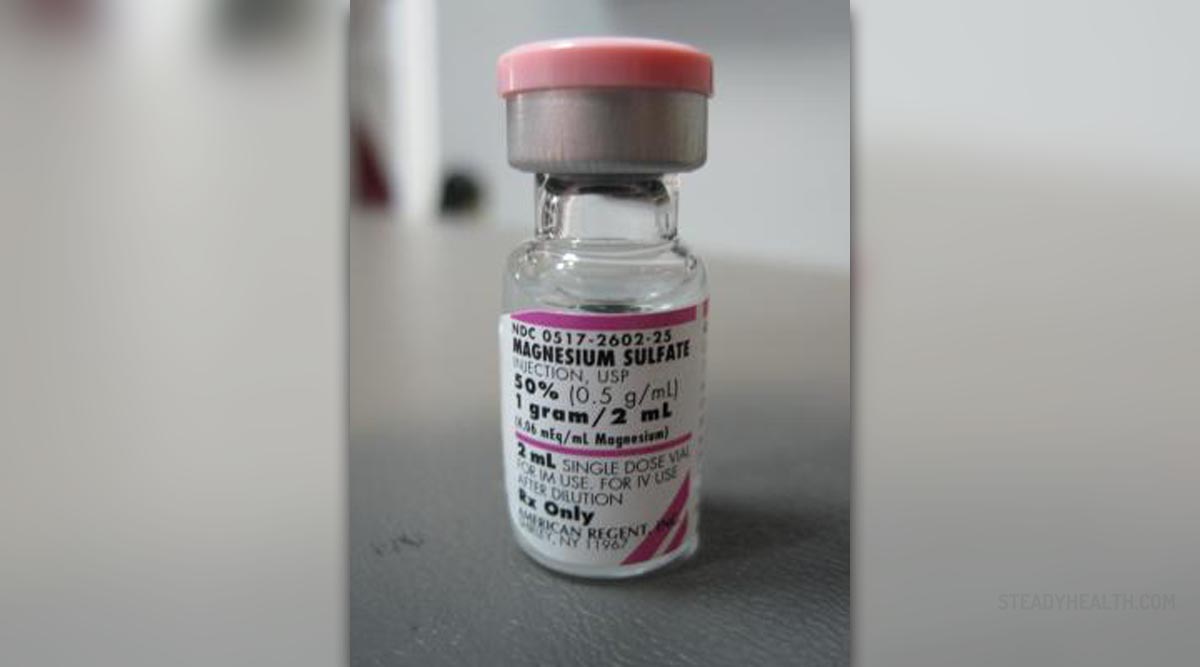
Magnesium sulfate is not known to cause adverse effects insmall doses. However, it may cause bothersome, persistent, unwanted oreven some serious effects in rare cases.
In general, patients using magnesium sulfate tolerate the medication very well. They respond very different to theheightened magnesium in the serum, and these excessive serum levels are responsible for the mostof the side effects.
General Adverse Effects
Patients receiving rapid bolus infusions of magnesiumsulfate can experience flushing and passing hypotension because of thevasodilatation provoked by the medication. If a person’s magnesium serum levelgoes over 3 or 4mEq/l (milliequivalent per liter) there is a possibility toexperience some depression of the central nervous system (the brain). It can bemanifested as confusion, disorientation, depressed reflexes, dilated pupils,hypotension, hypothermia, lethargy, flushing, sweating, flaccid paralysis orfrank coma. Some patients may experience cardiovascular depression orcirculatory collapse.
Magnesium serum levels higher than 11 or 13mEq/l may cause paralysis,respiratory depression, asystole or heart block. All these unwanted magnesiumeffects are easily antagonized with intravenous calcium.
Metabolic and Gastrointestinal Unwanted Effects
Studies have established the connection between the long-termuses of magnesium sulfate for the treatment of tocolysis in pregnant mothers andbone problems in unborn children. There might be some rachiticchanges, dental enamel hypoplasia or hypocalcemia in children whose mothers weretreated with this medication.
Patients treated with magnesium sulfate could also experience:hypomagnesia leading to hypocalcemia or hypokaliemia and provoking: nausea,vomiting, weakness, lethargy or anorexia. There were also some cases ofhypercalciuria and reversible maternal hypothermia.
In rare cases, when the magnesium level in the serumgets around 5mEq/l, patients might suffer from paralytic ileus, nausea ordiarrhea.
Nervous System Side Effects
Magnesium sulfate is known to cause some depression effectson the central nervous system in higher doses, while therapeutic doses for the seizuretreatment in eclampsia and preeclampsia are not known to cause any unwantedeffects.
Hypermagnesemia can cause muscle weakness, mental confusion,sedation and decreased tendon reflexes, hypotension and slower than normal respiratoryrate. Magnesium levels above 10mEq/l may provoke mental depression, coma,areflexia, respiratory paralysis or even curare-like effects. There were somereported deaths, especially in patients whose magnesium was over 15mEq/l.
Other Adverse Effects of Magnesium Sulfate
Additional side effects of magnesium sulfate includecardiovascular, ocular, respiratory and hypersensitivity reactions. Patients havereported flushing, hypotension, bradyarrhythmias and asystole. Cardiotoxicityis even more prominent if associated with acidosis, kidney problems, digitalistreatment and hypocalcemia or hyperkaliemia.
People treated with magnesium sulfate may also experience pulmonaryedema or respiratory arrest, double vision or dermatologic problems as the sideeffects of the medication.

















Your thoughts on this
Loading...